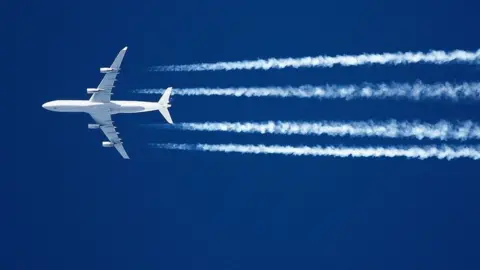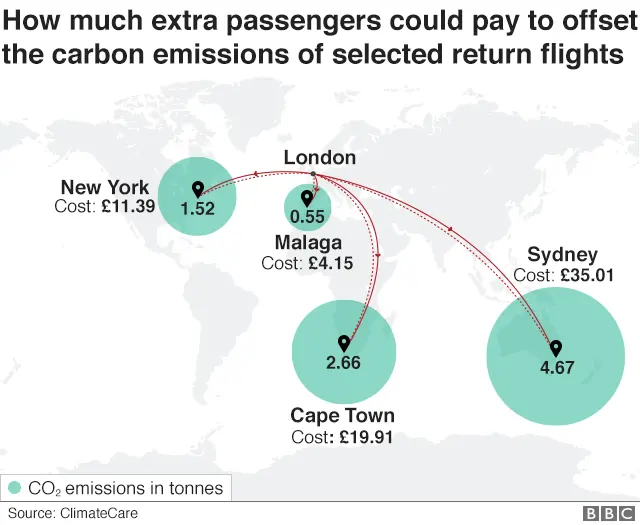Climate change: Half world's biggest airlines don't offer carbon offsetting
 Getty Images
Getty ImagesLess than half of the world's major airlines are giving passengers the opportunity to offset the carbon dioxide produced from their flights, BBC research found.
When airlines do offer such a scheme, generally fewer than 1% of flyers are choosing to spend more.
Carbon offsetting enables passengers to balance out their carbon footprint by paying towards environmental projects.
Aviation accounts for 2% of global human-induced greenhouse gas emissions.
Prices vary but a return flight from London to Malaga, Spain, would cost around £4 to offset.
The BBC contacted the world's biggest airlines in terms of numbers of flights and numbers of passengers.
Out of the 28 approached, less than half offered a carbon offset scheme and the majority declined to provide data on the number of passengers offsetting their flights during a one year period - often saying their figures were too low to report.
Michael Gill, a director from the international aviation trade body Iata, said: "We strongly recommend all passengers to use high-quality projects to offset their own CO2 emissions as an individual contribution to addressing climate change."
What is carbon offsetting?
Carbon offsetting allows passengers to pay extra to help compensate for the carbon emissions produced from their flight.
The money is then invested in environmental projects - like planting trees or installing solar panels - which reduce the carbon dioxide in the air by the same amount.
Passengers can pay the additional charge when they buy their ticket from participating airlines, but independent offsetting companies also exist.
The price varies between airlines, but a return flight from London and Cape Town, South Africa would cost roughly £20 to offset, according to ClimateCare.
The CO2 emissions per passenger from that flight is roughly the same as those produced from heating the average home for a year.
Some activists have criticised carbon offsetting as an excuse to continue polluting, arguing that it does little to change behaviour. Advocates defend offsetting just as vociferously.

How do the big airlines compare?
- British Airways does not run a carbon offsetting scheme. Instead, it gives customers the opportunity to contribute towards carbon reduction and community projects
- Lufthansa offers a carbon offsetting scheme, but uptake from passengers is less than 1%. Following the BBC's enquiry, the company said it would now make the offer more visible to customers during the booking process
- Ryanair does offer a carbon offsetting scheme, but the company refused to disclose the uptake by passengers
- American Airlines, the world's biggest airline, does not offer an offset scheme. The company says it has taken "many meaningful steps to reduce fuel consumption and CO2 emissions", including buying new, more fuel-efficient planes
- Emirates does not offer a scheme, but will be participating in an international carbon offset scheme from 2021
- Qantas bucked the trend with 10% of passengers opting to offset
What are airlines doing to combat emissions?
More people are flying than ever and over four billion passengers fly every year.
All international carriers must now report their CO2 emissions on an annual basis and the sector as a whole is aiming to halve its carbon footprint by 2050.
From next year, airlines will be required to offset any increase in emissions beyond their 2020 levels by reducing emissions elsewhere.
The new international system, known as Corsia and established by the United Nations, is the first time a single industry sector has agreed to a global measure to tackle climate change.
Prof Neil Harris, head of atmospheric informatics at Cranfield University, UK, says carbon offsetting "is a good idea but it's not working". He feels airlines and governments need to do more.
"All opt in schemes tend to have low take-up," he explained.
"Secondly I think there's a lack of clarity on what the scheme is. You want to know the money is being well spent."
Prof Kevin Anderson, who researches energy and climate change at the University of Manchester, said the most important thing was changing consumer behaviour.
"Most people just fly occasionally but there's this small group who are very frequent fliers. And these people cannot be using offsetting to allow them to carry on business as usual," he said.
"If we are serious about climate change, it is not a business-as-usual world, we will have to change how it is we operate. And until we accept that we're going to continue to fail on climate change and the emissions will continue to rise."
